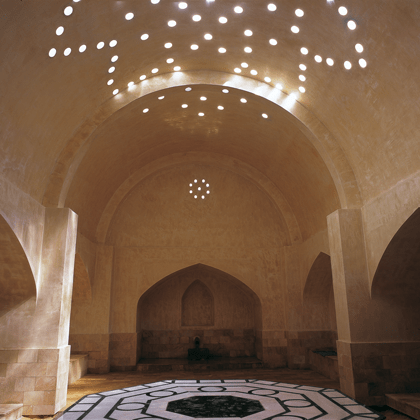“In my opinion, the interaction between cultures is something fundamental. East and west are not stable but dynamic concepts. On the one hand, east confronts west to avoid western centralism. On the other hand west confronts east to flee chauvinism. It is clear; the attraction to the work varies in terms of origins”.

”In my opinion, the interaction between cultures is something fundamental. East and west are not stable but dynamic concepts. On the one hand, east confronts west to avoid western centralism. On the other hand west confronts east to flee chauvinism. It is clear; the attraction to the work varies in terms of origins”.
HAMMAM – 2003
His work creates tensions and offers an alternative to the Eurocentric ideology through the use of material and metaphors which, like he himself, are foreign to the Western public. Furthermore, his many allusions illustrate his modus operandi on a large scale when it comes to overcoming the concerns of contemporary society: offering the public the possibility of a face to face encounter with the dynamics of our world by way of his site-specific facilities.
For his project undertaken in NMAC, Huang Yong Ping worked with the idea of the continuous interaction of factors which are opposing but at the same time complimentary. In this way he transformed a military barracks into a hamman, which results in the reutilisation of the space for another type of function and plays with our idea of the reality which surrounds us, allowing us to see the possibility of renovating settings, transforming them in new universes.
Constructed at three metres below ground level we enter a new world, in a place which challenges and opposes the rationalistic, cold reality of a barracks. With the work “Hammam” the artist wished to highlight the oppressed memory of Andalusia, its historic past, its legacy.
“The dramatic nature of the location, its provocative setting, offers a historical journey into the other civilisations which at one time inhabited this Andalusian territory for many years and have had a profound influence on its culture”.


